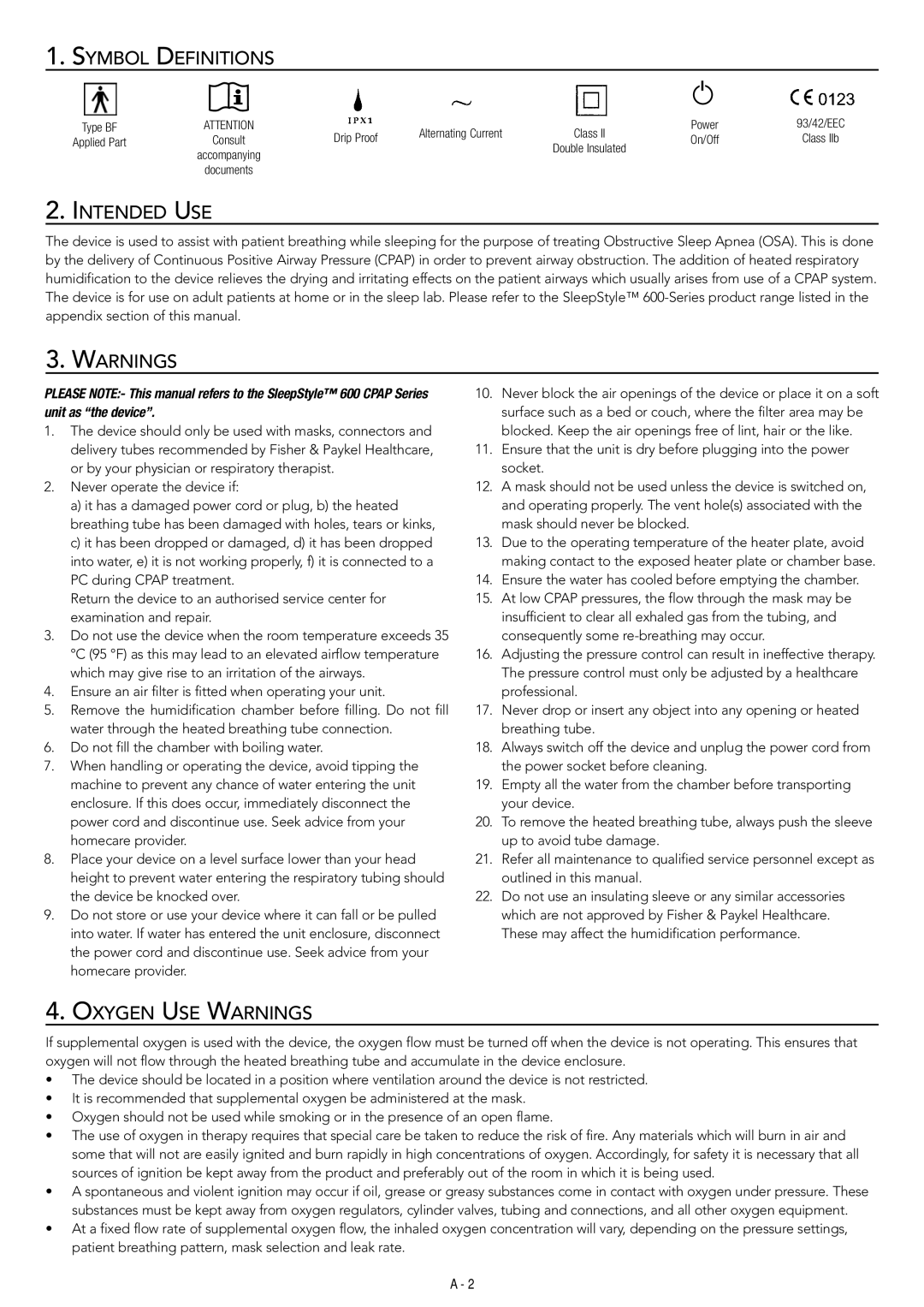
1.Symbol Definitions
Type BF | ATTENTION | Drip Proof | Alternating Current | Class II | Power | 93/42/EEC | |
Applied Part | Consult | On/Off | Class IIb | ||||
| Double Insulated | ||||||
| accompanying |
|
|
|
| ||
|
|
|
|
|
| ||
| documents |
|
|
|
|
|
2.Intended Use
The device is used to assist with patient breathing while sleeping for the purpose of treating Obstructive Sleep Apnea (OSA). This is done by the delivery of Continuous Positive Airway Pressure (CPAP) in order to prevent airway obstruction. The addition of heated respiratory humidification to the device relieves the drying and irritating effects on the patient airways which usually arises from use of a CPAP system. The device is for use on adult patients at home or in the sleep lab. Please refer to the SleepStyle™
3.Warnings
PLEASE NOTE:- This manual refers to the SleepStyle™ 600 CPAP Series unit as “the device”.
1.The device should only be used with masks, connectors and delivery tubes recommended by Fisher & Paykel Healthcare, or by your physician or respiratory therapist.
2.Never operate the device if:
a)it has a damaged power cord or plug, b) the heated breathing tube has been damaged with holes, tears or kinks,
c)it has been dropped or damaged, d) it has been dropped into water, e) it is not working properly, f) it is connected to a PC during CPAP treatment.
Return the device to an authorised service center for examination and repair.
3.Do not use the device when the room temperature exceeds 35 °C (95 °F) as this may lead to an elevated airflow temperature which may give rise to an irritation of the airways.
4.Ensure an air filter is fitted when operating your unit.
5.Remove the humidification chamber before filling. Do not fill water through the heated breathing tube connection.
6.Do not fill the chamber with boiling water.
7.When handling or operating the device, avoid tipping the machine to prevent any chance of water entering the unit enclosure. If this does occur, immediately disconnect the power cord and discontinue use. Seek advice from your homecare provider.
8.Place your device on a level surface lower than your head height to prevent water entering the respiratory tubing should the device be knocked over.
9.Do not store or use your device where it can fall or be pulled into water. If water has entered the unit enclosure, disconnect the power cord and discontinue use. Seek advice from your homecare provider.
10.Never block the air openings of the device or place it on a soft surface such as a bed or couch, where the filter area may be blocked. Keep the air openings free of lint, hair or the like.
11.Ensure that the unit is dry before plugging into the power socket.
12.A mask should not be used unless the device is switched on, and operating properly. The vent hole(s) associated with the mask should never be blocked.
13.Due to the operating temperature of the heater plate, avoid making contact to the exposed heater plate or chamber base.
14.Ensure the water has cooled before emptying the chamber.
15.At low CPAP pressures, the flow through the mask may be insufficient to clear all exhaled gas from the tubing, and consequently some
16.Adjusting the pressure control can result in ineffective therapy. The pressure control must only be adjusted by a healthcare professional.
17.Never drop or insert any object into any opening or heated breathing tube.
18.Always switch off the device and unplug the power cord from the power socket before cleaning.
19.Empty all the water from the chamber before transporting your device.
20.To remove the heated breathing tube, always push the sleeve up to avoid tube damage.
21.Refer all maintenance to qualified service personnel except as outlined in this manual.
22.Do not use an insulating sleeve or any similar accessories which are not approved by Fisher & Paykel Healthcare. These may affect the humidification performance.
4.Oxygen Use Warnings
If supplemental oxygen is used with the device, the oxygen flow must be turned off when the device is not operating. This ensures that oxygen will not flow through the heated breathing tube and accumulate in the device enclosure.
•The device should be located in a position where ventilation around the device is not restricted.
•It is recommended that supplemental oxygen be administered at the mask.
•Oxygen should not be used while smoking or in the presence of an open flame.
•The use of oxygen in therapy requires that special care be taken to reduce the risk of fire. Any materials which will burn in air and some that will not are easily ignited and burn rapidly in high concentrations of oxygen. Accordingly, for safety it is necessary that all sources of ignition be kept away from the product and preferably out of the room in which it is being used.
•A spontaneous and violent ignition may occur if oil, grease or greasy substances come in contact with oxygen under pressure. These substances must be kept away from oxygen regulators, cylinder valves, tubing and connections, and all other oxygen equipment.
•At a fixed flow rate of supplemental oxygen flow, the inhaled oxygen concentration will vary, depending on the pressure settings, patient breathing pattern, mask selection and leak rate.
A - 2
